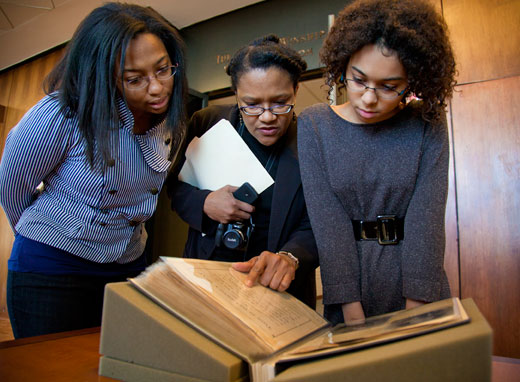Perhaps it was fate or mere coincidence that led Emory College senior Christy M. Turner to take a break from cramming for finals last semester and click on an Emory conservator's blog about a special scrapbook preserved by the Manuscript, Archives, and Rare Book Library (MARBL).
Honoring the late Rev. Ollie James Turner, an African American minister and active community leader in Mississippi, the scrapbook consisted of 17 loose manila folders emblazoned with black-and-white family photographs, postcards from afar, church program brochures, and certificates chronicling Turner's birth, marriage and death. Taken together, these standard artifacts captured a moment in history, encapsulating a life.
As the younger Turner continued reading the library's website, it became clear to her that this homespun memory book belonged to the great-grandfather she never knew. And, somehow, it had found its way to her Emory campus.
"It was very exciting to find out that there was a piece of my family's history at my university," she says. "There are so many stories of African American history that are empowering and uplifting and they need to be told."
News traveled fast among the Turner clan, many of whom were not even aware that a scrapbook existed. On Jan. 15, 24 family members ¿ representing four generations and nine states ¿ gathered at MARBL to speak with library conservators, view the scrapbook and celebrate a reunion in Atlanta, Martin Luther King Jr.'s birthplace, on the eve of his birthday. Later that day in Woodruff Library, Emory's King Week kicked off with a MARBL-sponsored poetry reading.
Finding a home at Emory

Rev. Ollie James Turner's scrapbook spans his life and service, covering decades of his family history, travel experiences, and dedicated pastoral career.
It is unclear how or why the scrapbook left the family's hands. Ollie Turner's daughter, Mary, an artist and teacher, compiled the book after her father died of a cerebral hemorrhage in 1966, according to Turner's son, Dwight, who attended the MARBL viewing. After Mary died, the book was likely part of her estate and squirreled away in storage.
A decade ago, David McCord, an Atlanta antiquarian book dealer, discovered the scrapbook while rifling through a booth of odds and ends at Scott Antique Market. The booth's owners, two African American women, were unable to recall how they acquired the book but it likely came from a storage unit, says McCord. A specialist in African American artifacts, McCord immediately appreciated the book's significance. It is relatively rare to find primary source material from the African American community prior to 1960, he says.
Preserving such records "reduces the opportunity for people to rewrite history," he adds.
McCord approached Randall K. Burkett, curator of MARBL's African American Collections, about including the piece in Emory's expanding archive of rare books, manuscripts, photographs, newspaper clippings and letters.
Eight years later, the Turner scrapbook is among the first to be restored under a $170,000 federal Save America's Treasures grant. The three-year matching grant will conserve and digitize 34 rare African American scrapbooks from 1890 to 1975. These include scrapbooks of author Alice Walker, vaudeville performers "Jolly" John Larkin and Johnny Hudgins, entertainer and playwright Flournoy Miller and W.S. Scarborough, former slave, author and Wilberforce University president. MARBL, Emory Libraries' Preservation Office and the Digital Curation Center are collaborating on the project.
Likening scrapbooks to the neglected orphans of the archive world, Burkett notes that they are often in fragile condition and difficult to handle. Turner's scrapbook was especially delicate, since the memorabilia was affixed with four different kinds of yellowing, peeling tape. Someone had punched holes in the folders but there was no binding, which meant that pages may have disappeared.
Conservators "stabilized" the photos, encased the folders in a protective polyester sleeves and assembled them in a new gray book cover. Though acidic, the folders were left as is to preserve the structural integrity of the scrapbook, says Kim Norman, a conservator for Emory Libraries who wrote the blog post on Ollie Turner.
"Turner's whole life was depicted in a very creative way," she adds.
Conservators have asked family members to try to identify the individuals in the photos to piece together a more complete history. Within several months, the Turner scrapbook will be accessible to researchers and the public at large through the MARBL website.
A life of service
Born in Lowndes County, Miss. in 1894, Turner was ordained as a Baptist minister at the age of 16 and presided over four separate churches. He earned his Bachelor of Theology degree at Mississippi Baptist Seminary, married his wife, Martha Gamble, in 1917 and had 11 children. An advocate for youth welfare, he traveled on mission trips to Egypt, Israel and Switzerland. He died at the age of 72.
"We feel that Emory is the best place for this family heirloom," says Turner's son, Dwight.
Christy M. Turner, who stumbled on Norman's blog the day after it was posted, hopes to honor her family's legacy by pursuing a career in law or politics.
"We as African Americans have a whole lot to be proud of," she says. "African American history is American history. If one person can accomplish so much regardless of race, then anyone can do it, especially in America."

